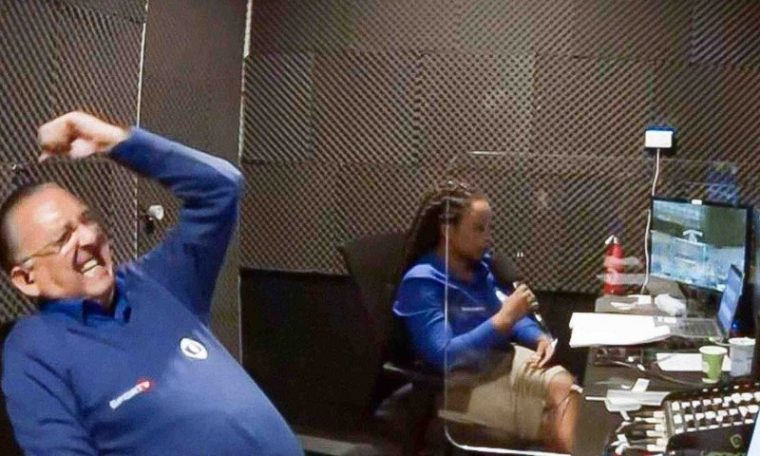
Sports narration, the way announcers follow a contest, has been changing in recent years. More spontaneous, colloquial, slang and emotional transmission, along with the use of more catchy phrases and sentences, has become almost a rule of thumb to maintain a connection with the audience.
In the view of professionals, the main reason for the change is the development of social networks, which require greater interactivity. The most recent example of this new way of describing sports on TV was the telecast of the Tokyo Olympic Games. The variety of modalities showed how narrators needed more flexibility.
There are many examples. First narrator Galva Bueno had anguish and excitement when gymnast Rebecca Andrade won the silver medal in the general individual competition. The broadcast was shown backstage by Rede Globo itself, which has the rights to broadcast the games in Brazil.
At the age of 71, the narrator recognizes that his mode of transmission is changing. “Life is made of that, always reinventing ourselves. The scope has expanded. The world has reshaped itself and it’s great to see. With all my experience, live the moment lighter, looser, happier Very nice,” Galvo Bueno told Estadio.
Luis Roberto de Masio Paranhos, the popular Luis Roberto who starred in Globo’s Olympic broadcast, revealed that he is trying to “be lighter”. “Fiction began to adopt a vocabulary that is more open to everyday conversation and primarily closer to the newer generations. We need to find a format that allows the new generations to come together without offending the older generations. brought together. Keeping in mind the customs of these people as well. In the end, we must be in tune with our times. Always rediscovering ourselves”, says the 60-year-old narrator.
Olympic broadcasting gave visibility to a movement that has intensified over the past three years, primarily on pay TV channels. Sergio Mauricio, the narrator of the band that follows sprint races, especially Formula 1, is the one who outlines a panorama of sporting narrative in the country in recent decades.
“In the 1970s and 1980s, voiceovers were more leisurely, with greater diction and intonation. The narrator’s interventions were more punctual. The arrival of Galvo Bueno and Luciano do Valle brings a faster and more active style. Cable The advent of TV enhanced these features even more”, explains the narrator who joined the band at the beginning of the year after a long time on the SportTV channels.
All speakers heard by Estadao are unanimous in saying that social networks are the main impetus for change in the narrative. With instant conversation, they became a kind of thermometer of what was going on on the small screen. TV channels often use comments from Internet users to enrich broadcasts. For Teo José, the voice of the Copa Libertadores and League of Champions games on SBT, the cell phone has become a second screen, parallel to the broadcast on TV or the Internet.
“It changed the audience, it changed the consumer. We have to give something more”, assesses Andre Henning, one of the people responsible for the broadcast of Champions League games on the subscription channel TNT Sports. “The narrator is no more who is telling what he is seeing and has also started telling what he is feeling and feeling. For me, very little has changed. The description has always been like this”, he says.
In this context, in the opinion of Luis Roberto, people want a company at the time of transmission. “Want to share with you what people are saying and commenting. They want to feel involved and be a part of that event”, says the 60-year-old narrator. “A few years ago, voiceovers were just a guide for the audience. Today it is clear that we need to be more than a ‘guide’. What is needed is to give us emotion, empathy and lightness”, he added.
catch phrases
One of the main features of game narration is the use of catchphrases, phrases that are repeated in specific situations and that reinforce the identity of the narrator. “I’ve always had a style of using catchphrases that I take from the street, from soap operas, to music. It’s been with me from the very beginning. I’ve always wondered if I’d like to hear certain things. I try to be nice and use recent phrases. I am also an internet user”, he says.
Everaldo Marx took one of his most catchy phrases – “You are ridiculous!” – Subscription TV channels from ESPN to Globo channels. For the first time on the new network, he used the catchphrase in driver Lewis Hamilton’s 91st win, when he equaled Michael Schumacher’s Formula 1 record.
“After the banner, I did a series of compliments, culminating in ‘You’re Freed.’ Even having said, noticed that, they felt it had a positive connotation. Zero noise including social networks”, he explains.
Catchphrases can vary according to the moment of departure, says Everaldo. In the final of the Olympic men’s basketball tournament between France and the United States, he said another of his trademarks – “While there is bamboo, there is arrow” – in French. “The more natural the communication, the more difficult it is. And the public identifies with that”, he says. (from the newsroom, with Estado content)



